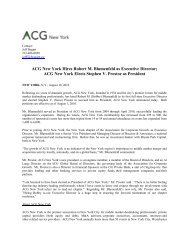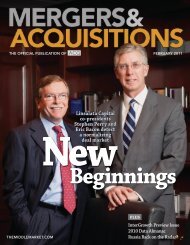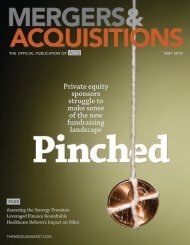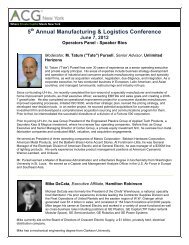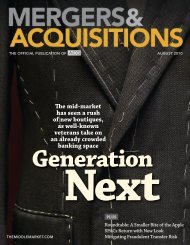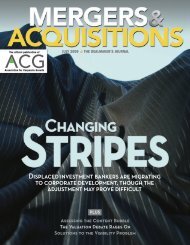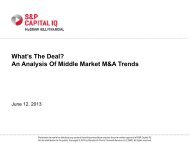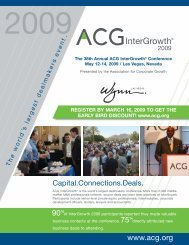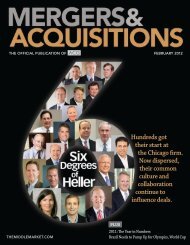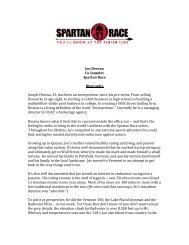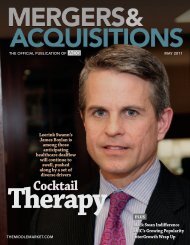Not one to mince words, KPS Capital's Michael Psaros offers a ...
Not one to mince words, KPS Capital's Michael Psaros offers a ...
Not one to mince words, KPS Capital's Michael Psaros offers a ...
- No tags were found...
Create successful ePaper yourself
Turn your PDF publications into a flip-book with our unique Google optimized e-Paper software.
06-08,78-85_ACG.qxd 4/6/09 5:11 PM Page 79THE PULSEdisproportionately affect minorities? I thinkthat federalized corporate decision-making, inan environment of the almost <strong>to</strong>tal dominationof the government by a party that has closeties <strong>to</strong> unions, will increasingly lead <strong>to</strong> politicizedeconomic policies and protectionism, impairingcross-border M&A as other nations retaliatewith protectionist policies.— Don Keysser, Managing Direc<strong>to</strong>r,Hannover Ltd.—————————The question contains a false assumption,namely that taxpayers are footing the bill forthe corporate refinancing now underway. In fact,these rescue financings are themselves beingJohn P. Adamsfinanced viasale of governmentdebt. Aswe all know theprimary buyersof that debt areforeigners, notablyfrom China,Japan andIndia. So becomingmore protectionistwould be<strong>to</strong> slice off thehand that feeds.One could do itbut it would notbe in our self interest<strong>to</strong> reduce trade with those who are keepingus afloat.Regarding the consequences of these refinancingsfor the M&A market, since the beneficiariesof the rescue packages are almostexclusively very large corporate entities, thequasi-takeovers of these behemoths by thegovernment should not impact the acquisitionof smaller firms. Probably it would be hard <strong>to</strong>sell Citibank or GM or AIG with the USA as astakeholder, but why would you want <strong>to</strong>— John P. Adams, President,Adams & Royer, Inc.—————————I don’t see the connection between taxpayerm<strong>one</strong>y flowing in<strong>to</strong> the banking system andprotectionism because the issue is liquidity, notkeeping ownershipof the industriesout offoreign hands. Alarger issue forM&A in theshort term isthat industriesthat need <strong>to</strong> failor divest assetsare being kep<strong>to</strong>n artificial lifesupport, whichkeeps them offRick Taftthe market (fornow). But taxpayerm<strong>one</strong>y isat best only a respite, not a cure. In fact it encouragesexecutives and politicians <strong>to</strong> paper overserious problems in favor of an illusory quick fix.So<strong>one</strong>r or later, the market inevitably will resetitself and flawed companies will fail or divest assetsanyway, so in the longer term M&A activityshould pick up and offer lots of creative opportunitiesfor well capitalized and patientbuyers. One effect of the taxpayer m<strong>one</strong>y mightend up being the difference between presidingover an inevitable but somewhat orderly liquidationof these assets or companies, versus thechaos of an all-out fire sale.— Rick Taft,Business Transfer Alliance—————————M&A activity will begin again in earneststarting as early as second quarter of 2009. Thebanking system is awash with cheap m<strong>one</strong>yright now, but no <strong>one</strong>’s lending. It’s that elusiveconfidence fac<strong>to</strong>r that lenders need <strong>to</strong> gain beforethey open the checkbook. The governmentfunding, as controversial as it may be, will bringa level of certainty <strong>to</strong> potential defaults thatloom on the horizon and have prompted the currentcredit lock in the country. The world as well,finds itself in this situation. Central banksglobally have supported the easing of rates.They have acted in rare cooperation and implementedliberal m<strong>one</strong>tary policies <strong>to</strong> increaseliquidity. There is a tsunami of liquiditycoming <strong>to</strong>wards us, once that confidencefac<strong>to</strong>r comes around. There is no shortage ofundervalued companies right now. Once thattsunami hits, M&A will spike upwards as dealsget funded.Can the buyers in these transactions expecta continued level of government involvementand “piggyback” onUncle Sam protectingits investment?<strong>Not</strong>likely. Even inthe DemocraticadministrationJim ConnorCongress ishaving great difficultypassing along-termbailout in theau<strong>to</strong> industry.More likely isthe fact thatcontinued protectionismthrough tariffs, taxation etc. resultsin the country declaring the bail out didn’t work,and we look for new alternatives.— Jim Connor, Managing Direc<strong>to</strong>r,BBK—————————Protectionism gives domestic producers anadvantage in the marketplace so restrictions onforeign competition would seem <strong>to</strong> be a naturalresult of pouring taxpayer capital back in<strong>to</strong> theUS markets. However, as protectionism tip<strong>to</strong>esin - globalization will eventually come <strong>to</strong> a standstilland it would strangle our competitive ability.The gains from free trade outweigh any losses.Free trade creates more jobs than it destroysand it allows countries <strong>to</strong> specialize in the productionof goods and services in which they havea comparative advantage.THE PULSE continued on page 98February 2009 ACG > MERGERS & ACQUISITIONS 79



